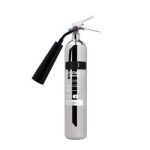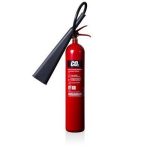Your cart is currently empty!
What Classification of Fire Can You Use a CO2 Fire Extinguisher For?
CO2 fire extinguishers are ideal for Class B fires. Those are fires where the primary fuel involved is a flammable liquid. However, sometimes a CO2 extinguisher may also be useful when tackling an electrical fire, as it can help avoid a risk of electrocution or water damage to other assets.
Flammable liquids can be more safely and effectively put out with CO2, as it drastically lowers the risk of splashing the liquids and spreading a fire further.
As you can probably tell, CO2 extinguishers are a fantastic tool for tackling some specific fire types. But there’s plenty of other information you might need to get the best out of them, and that’s why we’ve created an extended guide for you here at Fire Safety Equipment.

How to use a CO2 fire extinguisher
When faced with a Class B fire, knowing how to use a CO2 fire extinguisher could be lifesaving. Here is an overview of the main steps:
- Remove the pin from the handle, breaking the tamper seal
- Hold by the handle and the frost-free horn, then stand back a safe distance from the fire
- Aim the horn at the base of the flames
- Squeeze the extinguisher handle to discharge the CO2
- Fully discharge all the CO2, but be careful not to splash the burning liquid
Remember, only use a fire extinguisher if the fire is small and you feel confident in tackling it.
It’s also important that you do not use this particular extinguisher type in small, enclosed spaces as the displacement of oxygen can present an asphyxiation risk.
What fires not to use a CO2 extinguisher on
You should never use a CO2 fire extinguisher for cooking fires. These fires, involving oils, grease or fats, require specialist wet chemical extinguishers. Using a CO2 extinguisher in this scenario is likely to make matters worse, with the jet of carbon dioxide splashing the hot oil to spread the fire without having any extinguishing effect.
Read more about what you can and can’t use this extinguisher type for in our previous post.
How to identify a CO2 extinguisher
You can identify a CO2 extinguisher by the black label on the body of the unit or the frost-free horn; both of these separate this fire extinguisher type from the others.
How does a CO2 extinguisher work?
By displacing the oxygen that is feeding a fire (oxygen is one of three core elements a fire needs), a CO2 extinguisher can safely put out a Class B fire. Carbon dioxide is a gas released as a powerful stream to starve the fire of what it needs without disturbing the liquid that is on fire. The CO2 that comes out is also very cold, helping to lower the temperature.
Not only does this provide an effective way to put out fires involving flammable liquid, but it also works in a way that prevents the spread of the offending liquid. This makes it safe for some of the following business types:
- Chemical manufacturers
- Paint shops and factories
- Auto garages and mechanics
- Scientific laboratories
- Warehouses (stocking flammable liquid)
Can I get different-sized CO2 extinguishers?
Yes, in fact, here at Fire Safety Equipment, we’re pleased to offer our customers two different-sized CO2 fire extinguishers to help you meet any risk or challenge in your building and keep people safe. We have both a 2kg and a 5kg CO2 fire extinguisher, so whether you have a large or small space, you can get the right unit for your requirements.
Shop with us online today and get fast, free delivery of your high-quality CO2 fire extinguishers in the UK.



